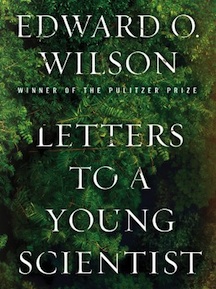By Sean Ross Meehan
Edward O. Wilson is among America’s most famous scientists of the last fifty years. His fame has resulted from both his significant and extensive contributions in his academic field of study, biology (specifically, the study of ants) and sociobiology, as well as through popular success writing from the perspective of his life in science for general audiences. He has twice won the Pulitzer Prize for General Nonfiction, has been listed among the bestsellers in the New York Times (including this latest book), and has even written a novel titled Anthill (2010). One can understand why Wilson would believe that “the ideal scientist thinks like a poet and only later works like a bookkeeper.”
His latest book offers a hybrid of poetry and science by way of autobiography and advice. The allusion in the title suggests that, just as Rilke does with his Letters to a Young Poet, Wilson seeks to define the meaning of science not abstractly or theoretically, but rather personally and even intimately. Wilson writes closely for someone thinking of following his path, writes for a younger version of himself who now knows better and knows well. For those readers looking to become a scientist, and specifically planning to pursue graduate study and research in biology, this book will no doubt prove insightful. Since I am not one of those readers, but did come to the book quite interested in grasping more personally what science means and how it matters in our culture, I was disappointed to find Wilson speak less to broader and more general contexts and issues facing science today. I left with an understanding of how a young scientist might pursue her career choices, but with less of a sense of how this scientist thinks science, beyond an academic career, should matter.
Wilson’s writing is elegant and the autobiographical exposition throughout these brief chapters is focused and purposeful. However, I was particularly troubled to find Wilson, in the final section of the book on “Truth and Ethics,” devote only four brief pages to what he calls “the scientific ethic.” While we can hope that among our young scientists today there will emerge others with the intellectual range and humanistic skills of E. O. Wilson, we might also desire that their training, at least as far as truth and ethics goes, extends beyond what Wilson offers here.
Sean Ross Meehan (ΦBK, Princeton University, 1991) is Associate Professor of English and Director of Writing at Washington College. He is a resident member of the Theta of Maryland chapter of Phi Beta Kappa.




